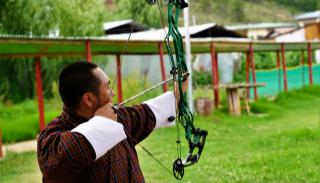
Breadcrumbs navigation
Heritage geopolitics: Hegemonic meaning-making, international orders, and the heritagisation of traditional archery in Turkey and beyond
In this short summary, Fulya Hisarlıoğlu and Lerna K Yanık discuss the key points from their new Review of International Studies (RIS) article. If you'd like to know more you can read the full article at - Heritage geopolitics: Hegemonic meaning-making, international orders, and the heritagisation of traditional archery in Turkey and beyond.
Drawing on the case of Traditional Turkish Archery (TTA), the article introduces 'heritage geopolitics' as a novel analytical framework to explain how cultural heritage simultaneously operates as a form of hegemony-building at both domestic and international levels. We explore this multiscalar and polyphonic heritage-making process that spans from the biopolitical (disciplining individual bodies) to the geopolitical (reordering international hierarchies and moral claims).
Moving beyond familiar paradigms such as soft power, cultural diplomacy, and heritage diplomacy, the article argues that heritage geopolitics examines not simply how culture is mobilised to achieve foreign policy goals, but also how the very process of heritagisation produces political subjects, moral hierarchies, and spatial orders. It highlights that heritage-making is not a passive reflection of pre-existing national identity but an active, 'productive politics' that constructs new forms of legitimacy and geopolitical belonging.
To theorise this process, we integrate insights from critical geopolitics, critical heritage studies, and Foucauldian biopolitics. We conceptualise heritage as a spatial and temporal instrument of power - shaping how nations imagine themselves and their place in the world through the revival, reordering, and performance of cultural traditions. By embedding heritage practices in physical sites, bodies, and institutions, states create new 'imagined geographies of collective morality'. These geopolitical imaginations redraw the boundaries between self and other, East and West, and authenticity and modernity. In addition to this, revival of heritage is at the centre of cultural hegemony building, which is based on the construction of a collective body of culturally authentic and morally pure people at both local and international levels.
Empirically, the article focuses on the AKP-led heritagisation of traditional archery in Turkey as a vivid case of heritage geopolitics in action. The revival of Ottoman-era archery, centred on the reconstruction of the Archers’ Lodge (Okçular Tekkesi). If you take a look at Okmeydanı's photo of Archer’s Field - Before and After in Istanbul and the establishment of the Archery Foundation (Okçular Vakfı) along with a museum (See Picture 2 on the Archers’ Lodge Virtual Museum - A View from the Archers’ Lodge Museum by Okçular Tekkesi Müzesi), it illustrates how cultural heritage is mobilised to produce both internal cohesion and external projection. These initiatives, closely associated with President Recep Tayyip Erdoğan and his son Bilal Erdoğan, link physical space, moral discourse, and political authority. A social media post on Instagram announced the launch of new education programs that combine 'Three Types of Education Together--Qur’an Education | Archery | Moral Values'. Translation of the post: “A comprehensive educational program prepared for children and youth is starting. Join this journey that appeals both to your heart and your body! Our courses are free of charge”.
Through the institutionalisation of heritage spaces, ritualised bodily practices, and international mega-events such as the World Nomad Games and the Conquest Cup, Turkey advances a mix of neo-Ottoman-Turkish-Islamic civilisational narrative that asserts moral superiority over Western modernity while promoting solidarity among 'brotherly' Turkic and Muslim nations as well as the countries of the Global South.
Our article demonstrates that this heritagisation process is multiscalar, operating simultaneously at the levels of transforming the understanding of individual discipline and moral norms, changing the urban space and contributing to the making of novel national identity, and geopolitical imaginations. The heritagisation of the traditional Turkish archery is also polyphonic, combining narratives of resistance, domination, and contestation under the guise of authenticity and unity. Through this lens, heritage becomes not only a repository of the past but also a mechanism for governing the present (and potentially the future) - a way of producing compliant bodies, loyal citizens, and a moralised geopolitical vision (See this social media post on Instagram announcing the 13th Conquest Cup bearing the Seals of the Archers’ Foundation, Turkey’s Presidential Office, and the Ministry of Youth and Sports of Turkey. Translation of the Post: “Competition! From Tradition to the Future”).
Heritage Geopolitics provides an innovative conceptual platform for analysing how states use heritage to craft alternative geopolitical orders both domestic and international levels simultaneously. By showing that the politics of heritage extends far beyond symbolic representation, the article reframes heritage as a strategic, spatial, and biopolitical practice that shapes the moral and material foundations of contemporary international relations.
Want to know more? You can read the full article at DOI: https://doi.org/10.1017/S0260210525101228
This particular article is open access, however BISA members receive access to RIS (and to our other journal European Journal of International Security) as a benefit of membership. To gain access, log in to your BISA account and scroll down to the 'Membership benefits' section. If you're not yet a member join today.
Photo by nimrod sheinman on Unsplash

